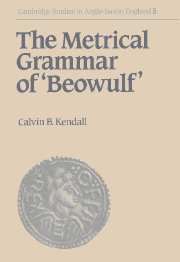Book contents
- Frontmatter
- Contents
- Preface
- List of abbreviations
- List of changes from Klaeber's text
- 1 The Beowulf-poet and his metrical grammar
- 2 The alliterative and metrical principles of Beowulf: Kuhn's ‘laws’ and the transformational rule
- 3 The three kinds of half-lines: extra-metrical alliteration and type A3
- 4 Displacement
- 5 Stressed proclitic adjectives: X-positions and the insertion rule
- 6 Problems with the identification of clause-non-initial half-lines: the proclitic onset
- 7 Half-lines with internal clause divisions: the transformational rule (revised)
- 8 The alliterative requirement of unstressed prefixes and the copulative conjunctions
- 9 The alliterative requirement of prepositions and the proclitic adverbs and instrumentals
- 10 The alliterative requirement of proclitic adjectives and pronouns: the alliterative rule of proclitics
- 11 Displaced and detached proclitics
- 12 The three classes of compounds: the alliterative requirement of class I compounds
- 13 The alliterative behaviour of class II compounds
- 14 The alliterative behaviour of class III compounds and simplexes
- 15 Metrical typology and the metrical grammar
- 16 Conclusions
- Appendix: A typology of the metre of Beowulf in relation to the metrical grammar
- Glossary of technical terms
- Bibliography
- Index of alliteration, scansion and metrical clause structure
- Index of verses specially discussed
13 - The alliterative behaviour of class II compounds
Published online by Cambridge University Press: 22 September 2009
- Frontmatter
- Contents
- Preface
- List of abbreviations
- List of changes from Klaeber's text
- 1 The Beowulf-poet and his metrical grammar
- 2 The alliterative and metrical principles of Beowulf: Kuhn's ‘laws’ and the transformational rule
- 3 The three kinds of half-lines: extra-metrical alliteration and type A3
- 4 Displacement
- 5 Stressed proclitic adjectives: X-positions and the insertion rule
- 6 Problems with the identification of clause-non-initial half-lines: the proclitic onset
- 7 Half-lines with internal clause divisions: the transformational rule (revised)
- 8 The alliterative requirement of unstressed prefixes and the copulative conjunctions
- 9 The alliterative requirement of prepositions and the proclitic adverbs and instrumentals
- 10 The alliterative requirement of proclitic adjectives and pronouns: the alliterative rule of proclitics
- 11 Displaced and detached proclitics
- 12 The three classes of compounds: the alliterative requirement of class I compounds
- 13 The alliterative behaviour of class II compounds
- 14 The alliterative behaviour of class III compounds and simplexes
- 15 Metrical typology and the metrical grammar
- 16 Conclusions
- Appendix: A typology of the metre of Beowulf in relation to the metrical grammar
- Glossary of technical terms
- Bibliography
- Index of alliteration, scansion and metrical clause structure
- Index of verses specially discussed
Summary
Mandatory alliteration marks fully stressed class I compounds. Class I compounds always alliterate in the second lift in the a-verse; they are excluded from the second lift in the b-verse. Furthermore, they impose an alliterative requirement on a following simplex in the a-verse. Finally, a class I compound whose first two syllables are long and stressed will not be preceded by a stressed monosyllabic simplex.
The alliterative behaviour of the various compounds and compound phrases which have not already been described provides the evidence for their classification as class II or class III compounds.
CLASS II COMPOUNDS
Class II compounds alliterate in the a-verse (except when the stressed element has a prefix which falls in the second weak metrical position (w2)), but they are not excluded from the second lift in the b-verse (where, of course, they do not alliterate), and they impose no alliterative requirement on a following stressed element. They include compounds with fixed stress prefixes, most compounds in which one or both elements have not retained their full semantic value, compound numerals, pronominal and adverbial compounds in æg-, the pronouns nathwylc and welhwylc, simplexes which are preceded by a proclitic and their alliterative equivalents – compound phrases in which one or more of the lift positions is occupied by a verb or an adverb.
The fixed stress prefixes in Beowulf are: æf-, æt-, and- (ond-), ed-, ful-, in-, ofer-, on- (an-), or-, uð-, wiðer- and ymb(e)-.l With the probable exceptions of ofer-, wiðer- and ymb(e)-, these form class II compounds.
- Type
- Chapter
- Information
- The Metrical Grammar of Beowulf , pp. 175 - 190Publisher: Cambridge University PressPrint publication year: 1991

